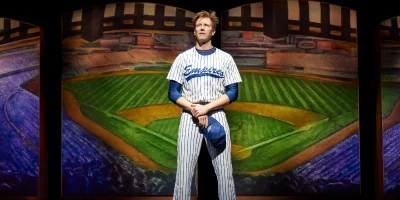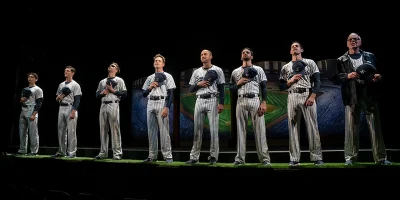
‘Take Me Out’ star Jesse Tyler Ferguson on baseball, representation, and tackling a Tony-winning role
Ferguson plays Mason Marzac, the gay business manager of a newly out Major League Baseball player who falls in love with the sport.
Back in 2003, Denis O'Hare won a Tony Award for playing Mason Marzac in Richard Greenberg's Take Me Out. For its Broadway revival at the Hayes Theater, Jesse Tyler Ferguson is stepping up to the plate.
When asked if following in O'Hare's footsteps made him nervous, Ferguson immediately gave an emphatic "Yes," a response I didn't expect from the seasoned actor. After all, between his 10+ years playing Mitchell Pritchett on ABC's Modern Family and his 25-year New York stage career, he has his own stacked roster of honors: two Drama Desk Awards, four Screen Actors Guild Awards, and five Emmy nominations.
But, of course, being the first new actor to take on an award-winning role on Broadway is a whole different ball game. Not to mention, his character is the only non-baseball player in a baseball play. Greenberg's drama follows a Major League Baseball center fielder, Darren Lemming (played by Grey's Anatomy star Jesse Williams), whose coming out as gay — and the backlash that follows — upsets his relationship with the sport. Ferguson's Mason is Darren's business manager, a comfortably out man who becomes a rabid baseball fan from nothing after meeting his new client.
The show isn't truly about baseball, though, according to Ferguson. "It's really a play about relationships," he says. "Baseball is a backdrop for this play that's about so many other things."
He would know: long before joining the revival, Ferguson saw the show's original Off-Broadway and Broadway premieres in the early aughts. And the themes it's really about — homophobia, manhood, passion — have stuck with him all that time and feel more relevant than ever. He chatted about that and more, and he's starring in this home run of a revival through June 11.
How does it feel to be back on Broadway after six years?
I wish I could come back to Broadway more often. I've had the great honor of being able to fit in small runs of things during my hiatuses from Modern Family. But it's harder with Broadway scheduling; limited runs are few and far between. I'm just happy I was able to come back to New York as much as I was.
The fact that I can be a part of this season celebrating Broadway's rebirth is just really profound and meaningful in a way that I wasn't quite expecting it to be. And you can definitely feel that amongst the community. It feels different than any other season I've had the pleasure of playing. It has its own sort of electric current.
How much of a baseball fan are you?
I've always appreciated it. But as far as following sports, I have other interests that pull me away from those things. But I am sort of living a parallel life to Mason in that I'm falling in love with the game of baseball very slowly. My exposure to it, rather than representing an out gay baseball player, is being able to speak these beautiful words by Richard Greenberg. That's been my "in" to the game.
A few weeks ago, [the cast was] given a private tour of Yankee Stadium, and I was very excited to go, mostly to spend some time with my castmates outside of the rehearsal room. It was a once-in-a-lifetime experience, but I certainly wasn't expecting to be as moved as I was.
And when I found out that we could actually go onto the field and just be there with the entire empty stadium around us — there aren't words [for] what that felt like. It was just so profound, and it actually changed the way I did part of the play.
Through this play, I've picked up at least the pageantry of the game and the pomp and circumstance of it all. I haven't picked up wild trivia or anything, and I certainly can't speak to it any more intelligently than I was able to a year ago, but I certainly have a much more profound and deep appreciation of the game.

How does Take Me Out resonate differently now than it did when it premiered?
Unfortunately, it resonates very deeply and in many of the same ways it did back in 2002. There's no active Major League Baseball player who has come out of the closet. I think visibility is so important, and I applaud all these athletes who have chosen to be open about who they are. We have out athletes in football, in tennis, in soccer — there can always be more. But there haven't been any in Major League Baseball, and that's disheartening.
We were meant to do this two years ago, and I think so much has changed in the world in those two years as well. There's a character, Shane Mungitt, who is incredibly racist and homophobic and says terrible, awful things, and uses ignorance as an excuse to be able to speak that way. [Two years ago] I was like, "Yeah, that's rough, but I just feel like people know better than to speak like that now." And then, here we are, and I just see that not much has changed, and people have been given voice in ways that they wouldn't have been given a few years ago.
What was it like working with Jesse Williams?
Every time [director] Scott Ellis would call for Jesse, we'd both answer. I'm now "JTF" in the rehearsal room; Jesse's "Jesse."
It was really wonderful to get to know him as a person and work with him and see his process. He's someone who has not done a lot of theatre — this is his Broadway debut. I don't think he's been on stage since he was in college.
I was just so taken aback by his ability to find a deep comfort level within this new landscape — rehearsing a play is so different than doing a TV show. We're here to really dissect the characters, and he was so game to do all of that. And he asked questions in the rehearsal room that I was just like, "Wow, he's a theatre guy! He's asking the right questions."
In all of my scenes, Mason's either onstage speaking to the audience by himself, or he's with Darren. I really don't [interact] with any of the other characters. As much as I love Jesse as a humanitarian and as a person, and I think he's a wonderful actor — [I thought] "What is it going to be like to put this together with him?" It's exceeded my expectations in so many ways.

How would you describe Mason's importance to Darren's coming-out journey?
Mason and Darren are these two ships passing in the night. Darren is at the top of his game and has made an announcement: He's come out of the closet, he's had a press conference about it, and he assumed that it wouldn't be a big deal. But there is a ripple effect, and that ripple effects shakes him. At the same time, Mason, who is Darren's new business manager, is falling in love with the game. While one person is figuring out if they're even in love with [it] still, the other person is falling harder and harder and harder.
That's a very heartbreaking thing because they are people that need one another. Mason needs Darren because he's given him a new lease on life and has allowed him to be more fully himself. Mason's somewhat of a hermit; [now] he's emerging from his home more often. And Mason is cracking Darren's facade. He's a hard-shelled human being who has been hiding his truth for so long. And here is this very open person who's come into his life. He's a very joyful person, and he's joyful because of the game of baseball.
Your character falls in love with baseball because he finally sees himself represented. Do you think audiences will feel represented in Take Me Out's characters?
I saw this play originally at The Public Theater 20 years ago, and then I saw it again when it transferred to Broadway. I remember being hesitant to go because I wasn't a huge baseball fan, and it was billed as a baseball play. [Then] Denis O'Hare stepped out, and I was like, "Oh, okay, that's my guy right there. Let's see what he has to say." And I fell in love with that performance and that character. I think that's one of the main reasons this works so brilliantly: It's really not a play about baseball. It's a play about relationships and masculinity and homophobia, but it's told through the lens of baseball.
There's so many people who are seeing this play and experiencing it for the first time who felt the same way as I did. And there's been so much more written about the play — I think people will have a deeper understanding of [it] before they get into their seats. I do think that character resonates for so many people. It's so necessary to have that outsider there, and I'm honored that I get to play the character that meant so much to me 20 years ago.

Did you feel any pressure taking on Denis O'Hare's Tony-winning role?
Yes. There's a shadow that his performance cast — an intimidating shadow over anyone who wants to play this part. There was a challenge for me to figure out, "Okay, well, what's my 'in'?" I don't remember what I ate for breakfast yesterday, but when I read the play for the first time, I would come across lines and remember the way Denis O'Hare said [them]. I realized that his performance was embedded in me. There are still moments in the play where I'm like, "How did he make that part work? I'm still trying to figure it out."
Denis reached out to me when [casting] was first announced, and he gave me his blessing and was wildly supportive. I reached out to him the day after our opening just to say thank you again for bringing this beautiful character to life 20 years ago. So there's a mutual appreciation between the two of us, which I really value, but it is still very intimidating.
So many people have come up to me that said, "I saw this originally done." And I just hope that my interpretation is something that they also see as valid. It certainly does not replace what Denis did, but I hope that it's serving the play in the correct way. I do think it is; I think we all are. That's the sign of a good revival, I guess. I think we have a good one on our hands.
This interview has been condensed and edited for length and clarity.
Originally published on



